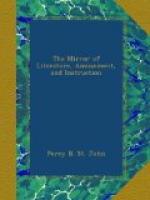The writer of the article “Sleep.” in Rees’s Cyclopaedia, says, “the proportion of time passed in sleep differs in different persons, and at different ages. From six to nine hours may be reckoned about the average proportion. Men of active minds whose attention is engaged in a series of interesting enjoyments, sleep much less than the listless and indolent, and the same individual will spend fewer hours in this way, when strongly interested in any pursuits, than when the stream of life is gentle and undisturbed. The Great Frederic of Prussia, and John Hunter, who devoted every moment of their time to the most active employments of body and mind, generally took only four or five hours’ sleep. A rich and lazy citizen, whose life is merely a chronicle of breakfast, dinners, suppers, and sleep, will slumber away ten or twelve hours daily. When any subject strongly occupies us, it keeps us awake in spite of ourselves. The newly born child sleeps most of its time, and seems to wake merely for the purpose of feeding. Very old persons sleep much of their time; in the natural progress towards death, the animal faculties are first extinguished; accordingly, when they begin to decline in decrepit old age, the periods of their intermissions are longer. The celebrated De Moivre, when eighty-three years of age, was awake only four hours out of the twenty-four; and Thomas Parr at last slept the greatest part of his time. An eye-witness relates that some boys, completely exhausted by exertion, fell asleep amid all the tumult of the battle of the Nile; and other instances are known of soldiers sleeping amid discharges of artillery, and all the tumult of war. Couriers are known to sleep on horseback, and coachmen on their coaches. A gentleman who saw the fact, reported, to the writer of this article, that many soldiers in the retreat of Sir John Moore, fell asleep on the march, and continued walking on. Even stripes and tortures cannot keep off sleep beyond a certain time. Noises at first prevent us from sleeping, but their influence soon ceases, and persons rest soundly in the most noisy situations. The proprietors of some vast iron-works, who slept close to them, through the incessant din of hammers, forges, and blast furnaces, would awake if there were any interruption during the night. And a miller, being very ill and unable to sleep, when his mill was stopped, on his account, rested well and recovered quickly when the mill was set going again. Great hunger prevents sleep, and cold affecting a part of the body has the same effect. These causes operated on the unfortunate women who lived thirty-four days in a small room overwhelmed by snow, and with the slightest sustenance, they hardly slept the whole time.”
P.T.W.
* * * * *
PERU: SIMPLICITY OF PASTORAL LIFE.
(To the Editor of the Mirror.)
After all that has been written and said on South America, by many recent travellers, it may probably be thought that the following remarks are rather out of time; but as a single fact may sometimes serve to show the state of a country more forcibly than volumes, I am induced to relate an anecdote which will throw a little light on the present situation of one portion of the natives of Peru.




